Most Recent News
SAFETY ALERT: FUL Centre for Flood Monitoring and Management Releases Safety Advisory
-
 Chris Yahaya
Chris Yahaya
- August 30, 2023, 10:07 am

The Nigerian Meteorological Agency (NiMet) issued a 2023 rainfall prediction, warning of an impending flood in parts of Nigeria. Additionally, the authorities of the major dams on the two rivers, particularly the Lagdo Dam, have issued statements regarding the release of excess water from the dams.
Findings by the Centre for Flood Monitoring and Management at the Federal University Lokoja indicate a gradual rise in the water level (approximately 8.54 meters as of August 29, 2023), implying an increase of about 0.003 meters per hour.
Given these circumstances and the potential for a spill from the Kainji Dam, it has become crucial to inform people residing in flood-prone areas that the rising water levels due to heavy rainfall pose a serious danger to their lives and properties.
The Centre appeals to all those living in lower areas to relocate to higher ground immediately. Precautions must be taken to ensure the safety of lives and properties for everyone.
The University Management, through its Centre for Flood Monitoring and Management, is providing information on how each of us can contribute to flood preparedness:
- Stay Informed: Monitor weather forecasts and flood alerts from relevant authorities. Staying informed about potential flood risks enables us to plan and take precautionary measures ahead of time.
- Prepare an Emergency Kit: Assemble a basic emergency kit containing essentials like non-perishable food items, water, medications, flashlights, batteries, and important documents. Such a kit can be invaluable during crises like flooding.
- Raise Awareness: Spread awareness about flood risks and preparedness measures within your community. Educate neighbours, friends, and family members about the importance of early preparation.
- Clear Drainage Systems: Unclog blocked drains and gutters around your homes to prevent localized flooding. Encourage community clean-up initiatives to ensure effective drainage even before heavy rainfall.
- Construct Flood-Resistant Buildings: If constructing or renovating, consider flood-resistant designs and construction practices. Elevating structures and using flood-resistant materials can minimize damage.
- Develop Emergency Plans: Create a family emergency plan detailing evacuation routes, meeting points, and contact information. Practice this plan with your loved ones to ensure everyone is ready.
- Support Local Authorities: Adhere to evacuation orders issued by local authorities during severe flooding. Their guidance is vital for ensuring safety during emergencies.
- Comply with Sustainable Land-Use Management: Follow land-use practices that integrate all environmental components into urban development and enforce these practices.
- Advocate for Climate Action: Promote sustainable environmental practices and endorse policies addressing climate change and urban planning. Our collective efforts can contribute to long-term flood mitigation.
It's time for us to unite against the threat of flooding. By staying informed, preparing adequately, and spreading awareness, we can significantly reduce the impact of floods on our lives and communities. The Centre will provide weekly updates on the water levels of our rivers.
Let's remain strong and resilient in the face of adversity. Our actions today can protect our future from the challenges posed by unsustainable practices. See more pictures here
For regular updates, follow Federal University Lokoja on the following social media handles:
Linkedin: linkedin.com/company/fulokoja
Facebook: www.facebook.com/fulokoja
Twitter: twitter.com/fulokoja
YouTube: youtube.com/@fulokoja001
Instagram: instagram.com/fulokoja
TikTok: tiktok.com/@fulokoja
Latest News
-
CSR: FUL Music Department Students Wow Governor Usman Ododo as Management Presents First Ever Kogi Anthem to State Government
July 17, 2024, 7:30 pm -
Power Generation: FUL Partners US-Based Company to Generate Electricity from Waste
July 17, 2024, 5:28 pm -
Groundbreaking Ceremony of Engr. Dr. Joseph Oyeyani Makoju Memorial Hall at FUL
July 13, 2024, 2:30 pm -
FUL Management Holds Familiarization Meeting with New Governing Council Amidst High Expectations
July 12, 2024, 10:20 pm -
CIPM Kogi State Branch Seeks Collaboration with FUL Registrar, Dr. Rebecca Okojie
July 12, 2024, 1:30 pm -
Groundbreaking Ceremony of Engr. Joseph Oyeyani Makoju Memorial Hall at Federal University Lokoja
July 12, 2024, 8:30 am -
FUL VC Lauds Senator Natasha's People-oriented Programmes as Lawmaker Pledges Support for Kogi Varsity
July 11, 2024, 10:34 pm -
Notice of FUL 20th Inaugural Lecture to be Delivered by Professor David Kolawole Omole
July 11, 2024, 4:12 pm